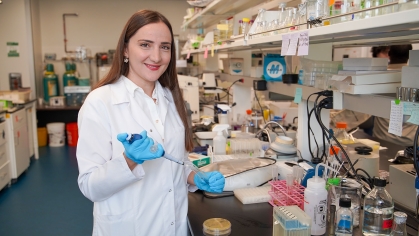Listen Now
The fellowship is given to individuals who have made exceptional contributions in the field of nursing.
Mary Ann Siciliano McLaughlin, a clinical associate professor in the Rutgers School of Nursing–Camden, has dedicated her career to excellence in nursing and education. She has set an example in her own practice and as a dedicated leader in the field.
That dedication was recognized recently when McLaughlin was selected for induction as a fellow into the prestigious National League for Nursing Academy of Nursing Education—an honor bestowed on just 23 distinguished nurse educators nationwide this year.

McLaughlin is grateful for the opportunity to continue elevating the profession.
“Becoming a fellow avails me the opportunity to continue to foster excellence in nursing education in a way that is substantive, enduring, and impactful,” said McLaughlin. “I strive to continue influencing change and empowering others to achieve success.”
The National League for Nursing (NLN) is the premier organization for nursing faculty and leaders in nursing education. Fellows in the NLN Academy of Nursing Education have demonstrated enduring expertise and substantial contributions to nursing education.
“This honor affirms what we at Rutgers–Camden have long recognized,” said Donna Nickitas, dean of Rutgers School of Nursing–Camden. “Dr. McLaughlin is a transformative educator and thought leader in our profession. I congratulate her on this outstanding achievement and thank her for her continued leadership and service.”
A core focus of McLaughlin’s work has been ethical nursing practice, Her doctoral research at Teachers College, Columbia University led to the development of the Siciliano-McLaughlin Model of Ethics.
Encouraging authenticity in nursing practice, the model emphasizes the importance of aligning personal values with professional actions. It centers on advocacy, dignity, humanity, integrity, and leadership, all within the framework of nurses' commitment to their patients.
“The model is designed to serve as a foundation of ethical decision-making in a real-world environment," said McLaughlin. "This encourages a commitment to following and promoting ethical practice by those on the front lines.”
McLaughlin has further contributed to the advancement of nursing education by publishing several essential teaching texts. Her nationally acclaimed book, Cardiovascular Care Made Incredibly Easy, translated complex clinical knowledge into engaging, accessible content for students at every level.
McLaughlin’s teaching philosophy, rooted in creativity, clarity, and compassion, has helped shape the careers of countless nursing professionals. And in a few short weeks, as the fall semester begins, she will return to the classroom to lead and inspire another class of nursing students.
“I want our new class of student nurses to know that they belong–both at Rutgers–Camden and in the nursing profession,” said McLaughlin. “It is this sense of belonging that will allow them to begin to form their professional identity in nursing. I also hope to challenge them to embrace lifelong learning in nursing as their professional identity continues to develop and evolve over time.”



